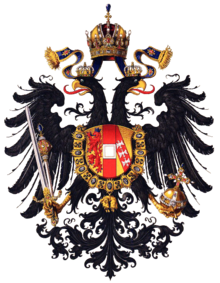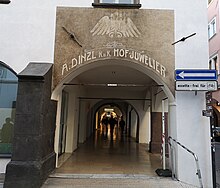kuk purveyor to the court


A kuk purveyor ( imperial and royal purveyor , sometimes k. & K. Purveyor was written) in the Austro-Hungarian Empire , a dealer or service (from 1911 also companies ) controlled by an imperial privilege a special permit had, goods and services to to deliver the court in Vienna . This privilege allowed the supplier to also advertise this publicly. If goods delivered to the court had to be imported, tax exemption was granted.
On the concept of the imperial purveyor to the court
A distinction must be made between companies that were either in Aryan ownership, i.e. owned by the farm, or their own companies.
Before the Hungarian-Austrian balance of 1867, which established the dual monarchy, a company called kk purveyor (Imperial and Royal Court) or only imperial court supplier .
A company only received the title if it was a leader in quality in its industry. The title of imperial and royal purveyor to the court was thus a seal of approval of the “very highest” class, the highest distinction that a business could achieve at that time.
In the heyday of Austria-Hungary there were more than 500 purveyors to the court in Vienna alone, others in Bad Ischl , Budapest , Karlsbad , Prague , etc. The total number of all companies is estimated at 2500.
To this day, there are a number of companies and businesses that have retained this title and are still openly managing it, in Vienna there are still around two dozen.
Privilege from the emperor
Suppliers first had to have a business relationship with the court. It was only after a period of several years that they were even considered for a privilege. This was then awarded by the emperor at the suggestion of the imperial court office or the chief court master and was not hereditary. Legal persons, i.e. companies, could only receive the title from 1911. The tax had to be paid to the court. The title of imperial and royal purveyor to the court was not a state award, but a personal act of the emperor or king. The court could revoke the title at any time.
An example of the wording of the award certificate is that of Johann Backhausen, head of the company Joh.Backhausen & Sons from 1888:
“From His Imperial and Royal Apostolic Majesty. Chief stewardship.
To Mr. Johann Backhausen, head of the J. Backhausen und Sons company, furniture fabric and carpet manufacturer in Vienna.
As a result of the highest resolution of October 28, 1888, as head of the Backhausen und Sons company, you will be awarded the title of Imperial Court Supplier.
You will retain this title as long as the business continues and with your personal participation.
By virtue of this, you have the right to use the imperial eagle at your company, but you are not allowed to use the imperial coat of arms in the seal. "
This privilege was typically advertised on company advertising, letterheads and products by displaying the imperial coat of arms or badge. Under the coat of arms usually appeared the statement kuk court supplier , followed by the title and the name of the company, and then which goods or services are provided. There was no specific standard as to what the eagle should look like. Suppliers from the Hungarian half of the empire carried the Hungarian coat of arms instead of the imperial eagle.
The award of the purveyor to the court was not only beneficial for the supplier. In return, the monarchy secured the support of the leading bourgeois commercial and industrial companies through this system of awards.
Court, chamber supplier and kk privileged
It is still important to distinguish that purveyors to the court either generally supplied the court or only specifically to a single person from the imperial family. A company could therefore be an imperial court supplier and / or chamber supplier . A chamber supplier to the emperor was the increase of a purveyor to the court. In this case, the origin of the word chamber means the private rooms, so the supplier could be admitted to the private rooms of the emperor or empress to perform his services. An entrepreneur could not become a chamber supplier until 1911 without already having the title of court. The selection process was carried out by the Obersthofmeister, who submitted the proposal to the emperor. The choice was made personally by the emperor.
Members of the imperial family could also have their own chamber suppliers. One example is Anton Hüller, who was purveyor to the imperial court and also purveyor to the chamber of his imperial royal highness Archduke Eugene of Austria for musical instruments. The selection process for a chamber supplier to an archduke or archduchess was not so strict and also not associated with a tax. Here, too, the title was not hereditary and expired if the rank of the imperial person changed (for example through marriage) or through the death of the lender.
The title of purveyor to the court should not be confused with the designation kk privileged for commercial enterprises, an authorization that has been preserved to this day in the form of the state award (bearer of the Austrian national coat of arms). The Republic of Austria also honors companies for special services to the Austrian economy with the state award and thus gives them the right to use the federal coat of arms in business transactions . However, this award is only available to companies with a company headquarters in what is now Austria.
Todays situation
Even in today's Republic of Austria, some companies are still actively promoting this title, although it has lost all official significance. Since the loss of privilege and protection, former purveyors to the court have had to struggle with cheaper competition. Nevertheless, the former imperial and royal court suppliers still have an excellent reputation and an aura of exclusivity and the high quality of the products that were previously valued by the imperial court. Products from these companies are still among the most expensive and exclusive in the whole country and are still very much appreciated by customers and enthusiasts. The usually high quality and the associated higher price of the products or services are often difficult to turn into profit in the age of cheap mass production.
Several traditional companies in the triangle Kohlmarkt, Graben and Kärntner Straße had to close at the end of the 1990s and give way to international branded companies, be it due to age reasons of the owners who had no heirs, or due to skyrocketing rents or high transfer fees. The "button king" Alois Frimmel had to be closed forever by the last owner Erika Frimmel at 73. The monument protection was at least able to ensure that the historical facility was retained to some extent even with the new owner. The famous clothing store E. Braun & Co. on Wiener Graben was also taken over by the Palmers chain and Hennes & Mauritz moved into the house in 2005 , continuing the tradition of selling clothes in the shop and maintaining the historic interior. The bronze letters above the entrance still bear the old company name. Other purveyors to the court such as the Demel and the Sacher confectionery are still highly profitable, thanks in part to tourism , and are expanding.
In June 1996, the Society of Former Imperial and Royal Court Suppliers organized an exhibition in Schönbrunn Palace on the occasion of the Millennium Exhibition, in which 27 companies presented themselves.
Both the Hofbäckerei Edegger-Tax in Graz, Hofgasse and the kuk Hofbäckerei on Linzer Pfarrplatz have particularly old wooden shop portals, run a café and are run by family descendants. In the “imperial city” of Bad Ischl , former kuk court suppliers are also still economically active today with the Zauner confectionery and the health resort pharmacy.
See also
- List of imperial and royal purveyors to the court 1856
- List of imperial purveyors to the court 1866
- List of purveyors to the imperial court 1868
- List of imperial and royal purveyors to the court 1899
- State award
literature
- Joachim Kronsbein. “Have chosen?”: Vienna's purveyors to the court cultivate nostalgia. In: Spiegel Geschichte , 6/2009; The Habsburgs: the rise and fall of the most powerful family in Europe .
- Catharina Christ: Jewish k. and k. Purveyors to the court in the textile industry with a branch in Vienna from 1870 to 1938 . Dipl.-Arb., Vienna: University, 2000
- Ingrid Haslinger: Customer - Kaiser. The story of the former imperial and royal purveyors . Schroll, Vienna 1996, ISBN 3-85202-129-4 .
- János Kalmár, Mella Waldstein: Imperial and Royal Court Suppliers of Vienna . Stocker, Graz 2001, ISBN 3-7020-0935-3 .
- The end of the button king. In: Neue Zürcher Zeitung. May 7, 2004, accessed February 2, 2009 .
- Roland Mischke: The Kaiser was a customer here. In: Handelsblatt. July 12, 2003, accessed February 4, 2009 .
Individual evidence
- ↑ Claudia Haase, Alexandra Kropf: Where the customer is still Kaiser. (No longer available online.) Wirtschaftsblatt, June 15, 1996, formerly in the original ; Retrieved February 2, 2009 . ( Page no longer available , search in web archives )
- ↑ The End of the Button King. Neue Zürcher Zeitung, May 7, 2004, accessed on February 4, 2009 .
- ^ Paul Lester: Inner City of Vienna: Are we digging up tradition? Die Presse, April 2, 2004, accessed February 4, 2009 .
- ↑ About us: Handwerkskunst - Familientradition , kuk-hofbaeckerei.at, Fritz Rath, accessed on January 8, 2018 - "Great-grandfather Karl Helletzgruber was appointed chamber supplier to Sr. kuk Highness Archduke Peter Ferdinand of Habsburg-Lothringen, Tuscany."
Web links
- kuk purveyors to the court
- Lehmann's General Housing Gazette along with Commerce and Industry Address Book for the kk imperial capital Vienna and region ( online at Wien Library )
Here z. B. Year 1910, Volume 1, p. 1161 : Hoftitel. Tradespeople and industrialists in Vienna who are entitled to use the kuk court title (sometimes also the kuk chamber title).

